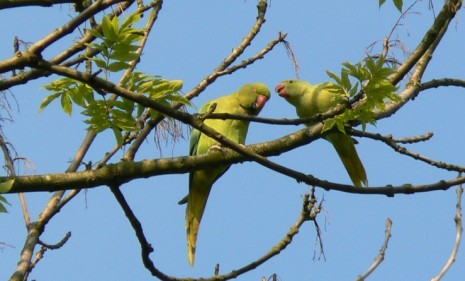London's 'ludicrous' parakeet problem
Rose-ringed parakeets have proliferated and become a nuisance in the suburbs around England's capital in recent years. A guide to the bird boom

London's suburbs are being besieged by thousands of rose-ringed parakeets. The once-exotic birds, native to India and Africa, have relocated to England in droves and have emerged as a nuisance to many residents — and a potential threat to British crops. Here, a guide to London's parakeet problem:
What type of parakeets are we talking about?
Rose-ringed parakeets are bright green with pink beaks and "voluble personalities that have long made the tropical species a popular household pet," says Elisabeth Rosenthal in The New York Times. The birds are a hardy breed, "able to withstand extreme temperatures, from hot summers to harsh winters," says Laura Holt at The Green. They're also "very adaptable in what they eat — dining out on fruit trees, orchards, and bird tables — and they aren't vulnerable to many diseases."
The Week
Escape your echo chamber. Get the facts behind the news, plus analysis from multiple perspectives.

Sign up for The Week's Free Newsletters
From our morning news briefing to a weekly Good News Newsletter, get the best of The Week delivered directly to your inbox.
From our morning news briefing to a weekly Good News Newsletter, get the best of The Week delivered directly to your inbox.
How many of the parakeets are in Britain now?
More than 30,000 in southeast Britain alone, up from 1,500 in 1995. To get a better count and learn more about the bird population, researchers at Imperial College in London set up what they call "Project Parakeet" and asked volunteer bird-watchers to count birds in various spots.
How did these "emerald invaders" get to England?
The theories abound. "Some say they escaped from a film set in Ealing. Others, that Jimi Hendrix released them on Carnaby Street in the Sixties. Or perhaps they broke free from an aviary during the storm of 1987?" says Holt at The Green. But the most likely explanation is the simplest one: The birds that started the current boom were pets that escaped or were released by their owners.
A free daily email with the biggest news stories of the day – and the best features from TheWeek.com
And why are they multiplying in such numbers?
Here, too, there are a number of theories, says Rosenthal in the Times. The parakeets are adaptable; the climate has been comfortable for them; gardeners may be planting more exotic plants, giving the parakeets more familiar food; or suburbanites may simply be putting up more feeders and offering more bird seed. There's also a "lack of predation," with only sparrowhawks — which prefer other meals — presenting a threat, says Holt. Two years ago, Natural England designated rose-ringed (also known as ring-necked) parakeets as pests, which meant they could be shot without a licence. The London Wildlife Trust complained this amounted to discrimination, as the exotic birds had become "as British as curry".
What kinds of problems are they causing?
They're noisy, for one thing. And they clean out bird feeders. "I was delighted when I first saw one in my yard, but when you have a flock of 300, it's a different matter," says retiree and volunteer bird counter Dick Hayden, as quoted in the Times. "They ate all the food from my feeder in one day; it was ludicrous. I had to stop putting it out because it got too expensive." They clean out berry bushes, and officials are watching to see if they ravage crops, as they have done in India, or force out other species of birds. So far, neither of those things has happened.
Sources: The Green, NY Times, Guardian, Treehugger
-
 Le Pen back in the dock: the trial that’s shaking France
Le Pen back in the dock: the trial that’s shaking FranceIn the Spotlight Appealing her four-year conviction for embezzlement, the Rassemblement National leader faces an uncertain political future, whatever the result
-
 The doctors’ strikes
The doctors’ strikesThe Explainer Resident doctors working for NHS England are currently voting on whether to go out on strike again this year
-
 5 chilling cartoons about increasing ICE aggression
5 chilling cartoons about increasing ICE aggressionCartoons Artists take on respect for the law, the Fourth Amendment, and more